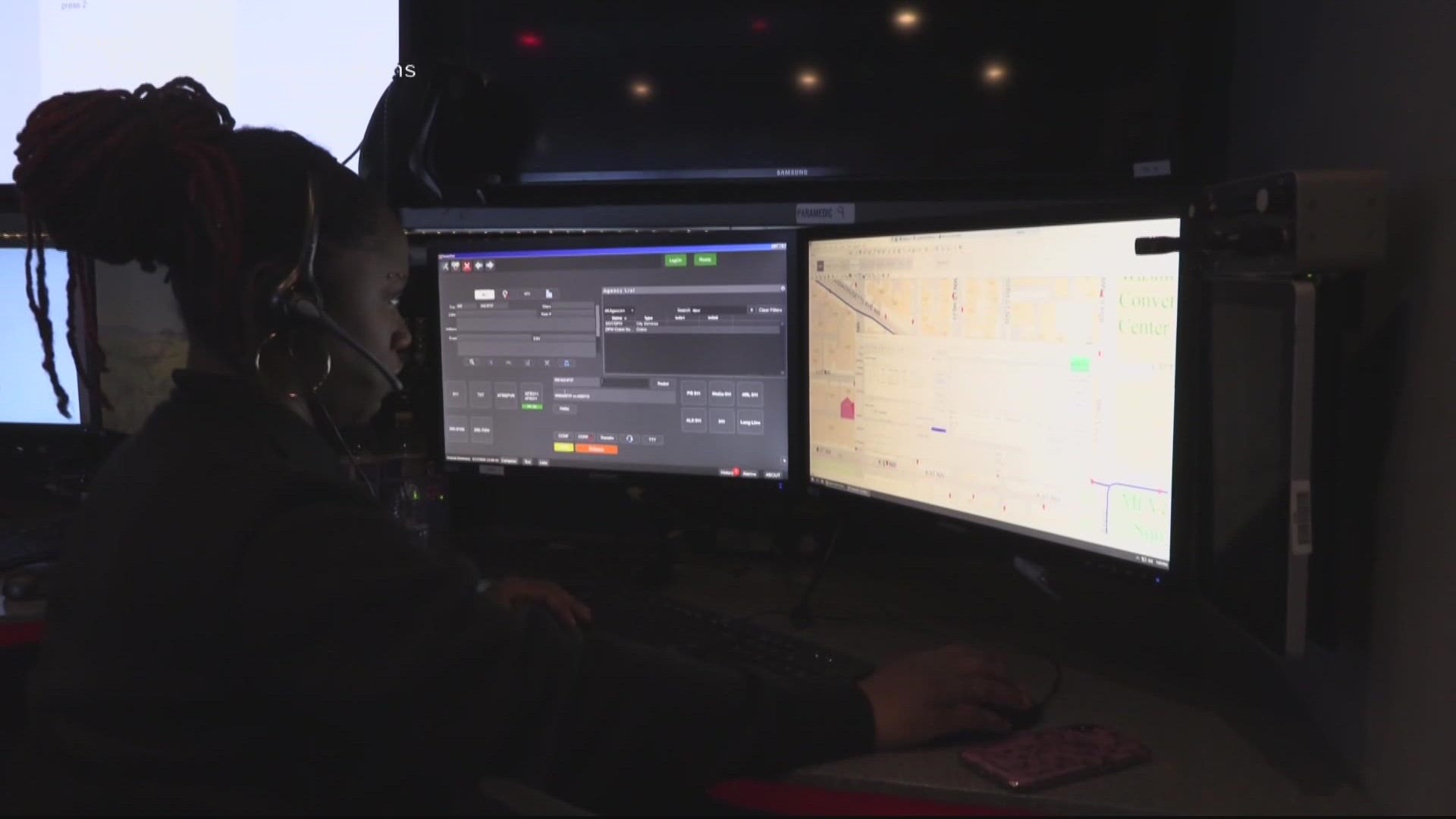WASHINGTON — A new report taking a look at the reform status within the Office of Unified Communications (OUC), which has faced criticism over 911 delays leading to deaths, claims the department has made minimal progress.
The report from the Office of the District of Columbia Auditor was released Friday. District of Columbia Auditor Kathleen Patterson writes to DC Mayor Muriel Bowser and DC Chairman Phil Mendelson at the beginning of the report.
"As the title indicates, very little progress has been made," Patterson writes. "It is our hope that the report provides a baseline against which future progress can be measured."
OUC has faced criticism after multiple people have died while waiting for help from 911.
In July, a 1-year-old girl died as her parents waited for help after the 911 dispatcher who took the call recorded the address incorrectly in the system. The address was corrected at 2:34 a.m. in the notes section, but the dispatcher did not update the location field in the dispatch system, causing first responders to go to the wrong address.
First responders were eventually able to find the correct address and arrived to help around 2:37 a.m., more than 10 minutes after the 911 call was first received.
"I just want justice for my daughter, because I feel like if they had got here on time, she'd still be here," the child's mother Shartise Schatzman said.


In May, 54-year-old Joyce Robertson passed away after suffering a cardiac arrest. The ambulance that was supposed to arrive with help was sent to the wrong address.
“She told me hold on the line until they get here,” Joyce's mother Patricia Robertson said.
Turns out, while Robertson waited more than 11 minutes for help, the ambulance was sent to the wrong home. By the time medics got there, it was too late.
The new audit references an October 2021 report that identified 31 recommendations intended to change and improve services. The report found there was a lack of adequate oversight of call-taking and dispatch operations. It resulted in failing to follow policies and procedures, and a proper follow-up to make sure everyone is in compliance across the board.
“I think these are critical issues and the leadership of the District needs to put its arms around this agency and make sure this critical service is improved,” Patterson said.
The new 44-page audit breaks down all 31 recommendations and takes a look at the progress OUC has made in each one. Of the 31 recommendations, the audit reports that OUC has made minimal progress regarding 22 of them.
"While we see indications of effort and movement within some areas, there has been minimal overall progress towards this set of recommendations as summarized below," the audit reads.
Patterson said she was disappointed at the lack of action taken by D.C. officials on this issue. She said a full budget cycle occurred in D.C., since the 2021 audit was released, without some of her offices ever being considered for funding.
“Responding to emergency calls is maybe the most critical function of a local government like ours and not doing the very best we can is just not acceptable,” she said.
OUC Director Karima Holmes sent a letter to Patterson in response to the audit saying she is pleased by her team's progress and looks forward to meeting with the audit team to discuss it.
“Immediately upon my appointment as Acting Director on March 7, 2022, I reviewed the audit and began forward progress on a roadmap for improvement,” Holmes wrote. “In the time since then, I also rounded out my executive leadership team with subject matter experts and we began to tackle the task list I developed to address the findings and recommendations in the report.”
Patterson said her office gave Holmes an opportunity to review its latest report on OUC two weeks ago. In her letter, Holmes mentioned that her office provided the auditor a roadmap to how it would implement recommended changes in May.
On Friday, OUC released its 18-page roadmap for change to the public.
Bowser reappointed Holmes to her position as director of the OUC in March. She previously served in that role from 2015 to 2021. During her previous tenure, Holmes's office came under fire for the same accusations that have been placed against it now.
Long-time safety advocate and former WUSA9 reporter Dave Statter runs the website Statter911.com.
In 2020, he told WUSA9 he had logged 35 different calls from OUC to DC Fire and EMS, during a nine-month span, that went to the wrong address.
"My time as a dispatcher was 40 some years ago. That was before computers," Statter said. "I was a fire dispatcher in Prince George's County, but we had to know the county, we had to know the roads, we had to understand how the system works. If you don't know that and you're just reading off a screen and what the computer tells you, you're going to fail."
Reporters pressed the Mayor on Thursday as to why she has kept Holmes in her role. However, Bowser once again defended her appointment of the embattled OUC director.
“Karima Holmes brings a level of experience that’s unparalleled in my experience being in D.C. government,” she said.
The mayor said OUC dispatchers are tasked with a stressful job.
“The OUC gets thousands upon thousands upon thousands of calls,” she said. “All with people calling in various stages of distress. Now, if you want to pick out, or cherry pick, one or two calls, you can do that, but [there’s] thousands of calls where police, fire, and ems are dispatched to DC residents in times of distress.”
Bowser added the District government is focused on learning from all its calls as to what may need to be changed in the future. But, she said that comes with a caveat.
“What we won’t do is really focus on information from one or two people when we have a vast examples of the type of stressful work that they do every day,” Bowser said.
WUSA9 contacted the mayor’s office to see if it would like to comment on the Office of the DC Auditor’s latest report, but it has yet to receive a response.
Patterson said she was surprised by Bowser’s reappointment of Holmes in March. She added it was possible the mayor was not being well informed by her subordinates.
“I know I've heard her say publicly, previously, that Ms. Holmes has a great resume and that is true,” Patterson said. “But the audit we published in October [2021] really did cover the period of time that she ran this agency and I have to consider that not a successful leadership of the agency. So, to return her to the position, I'm baffled.”
- Evaluate and reduce the number of event types and associated priorities.
- Streamline the call entry data in the CAD system.
- Assess and improve the integration of the scripted protocols (CBD) into the call handling process.
- Reduce improvising and adlibbing by adhering to the scripted questions in the CBD call processing standard.
- Ensure the complete acquisition and entry of all caller/reporting party information.
- Verify address information as defined in OUC policy. Adapt policy to allow immediate confirmation of location if an exact match is found between caller reported location and LDT map pinpointing of location. This will save time in gathering information.
- Require the use of LDTs to locate a caller that cannot immediately state a precise location of an incident, and in situations where the caller does not know the address of an incident.
- Improve customer service through QA review and follow up and requiring training and in-service (ongoing education) that addresses tone, inflection, and professional presentation.
- FE recommends the addition of an automated dispatch function to the CAD system and the FEMS dispatch process. Automating the broadcast announcement of event type and location will enhance and improve the ability of the FEMS dispatchers to meet the 60 second notification to units NFPA standard.
- OUC to develop and assign a minimum of three supervisors around the clock on the operations floor with assigned discipline focus on calltaking, MPD dispatch, and FEMS dispatch.
- A fourth supervisor to be added as an available resource intended to provide backup to the on-duty supervisors and for the performance of required administrative duties such as evaluations, QA reviews and follow up, scheduling and call outs.
- Include refresher or in-service training in call etiquette, professional tone.
- Enforce OPSD policy for returning completed QA reviews and for follow up to ensure the behavior is not repeated.
- Improve documentation concerning the completion and follow up of QA reviews with staff.
- Provide timely feedback to staff through the OPSD. Industry best practice requires that QA reviews be completed within a few days of the call occurring whenever possible, and that feedback be provided to the call-taker as soon as possible thereafter.
- Track corrective behavior outcomes including compliance to protocols and customer service. Ensure any training, action plans, or required coaching is discussed and documented, along with a set time for follow up and conclusion. The consistent methods in this approach will support improved call-taker performance and quality improvement center wide.
- Evaluate and document the results of remediation training efforts.
- Use the quality assurance data to identify training and process gaps and trends throughout the center. Also use this data to create a quality improvement program that addresses additional training, policy changes, and support for consistent improvement in call-taker performance.
- Schedule staffing of call-taking positions according to predictable spikes in call volume over a 24-hour period as outlined in Table 7 of the original report.
- Review the daily break schedule of the MPD dispatchers with a view to maximize staff availability.
- Consider consolidating the back-up dispatcher role to support multiple (two or more) channels rather than a one-to-one assignment.
- Maintain staffing levels as outlined in Table 15 of the original report that includes consideration and staff count to address known and projected turnover as detailed in Section 3.3.8 of the FE recommendations report submitted on October 19th, 2021.
The audit also says that OUC has made no progress in implementing 2 recommendations.
The recommendations that have seen no progress include:
- Expand the training and development of supervisors specifically in leadership and soft skills.
- Determine if there are additional applications that would augment or replace this service.
Click here to read the full report.

